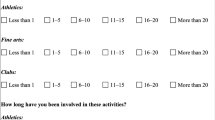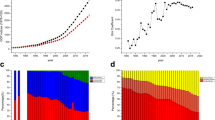Abstract
The Enforcement Decree of the Elementary and Secondary School Act (2015) mandates that from 2016 all middle schools in Korea must administer one semester as a free semester (FS), called an exam-free semester or, alternatively, a free learning semester. Consequently, some Korean parents and students have expressed a feeling of anxiety about having no exams during the FS. This anxiety arises primarily from their concern about academic loss and neglect of study in the absence of exams, with ensuing lower achievement in future tests. There are many studies showing a positive effect of the FS on learning, but little is known about its practical effect on student achievement. Thus, this study explored if the FS affects students’ achievement by estimating the average population treatment effect of the FS policy on academic achievement in Seoul schools. Based on the inverse probability of treatment weight (IPTW) approach with existing empirical data, the study found that, overall, no substantial differences were noticed in the academic achievement between the pilot FS schools and the non-FS schools. The findings provide empirical evidence for the effect of the FS on academic achievement, as well as critical information for policy makers.

Similar content being viewed by others
References
Austin, P. C., & Stuart, E. (2015). Moving towards best practice when using inverse probability of treatment weighting (IPTW) using the propensity score to estimate treatment effects in observational studies. Statistics in Medicine, 34, 3661–3679. https://doi.org/10.1002/sim.6607.
Brookhart, M. A., Schneeweiss, S., Rothman, K. J., Glynn, R. J., Avorn, J., & Stürmer, T. (2006). Variable selection for propensity score models. American Journal of Epidemiology, 163(12), 1149–1156. https://doi.org/10.1093/aje/kwj149.
Burstein, L. P. (1980). The analysis of multilevel data in educational research and evaluation. Review of Research in Education, 8, 158.
Cai, W. (2014). Making comparisons fair: How LS-means unify the analysis of linear models (Paper SAS060-2014). Cary, NC: SAS Institute Inc.
Chang, E. J. (2011). The rise of the meritocracy in Korean society and its education problem: In searching for the democratic justice. Society and Philosophy, 21, 71–106.
Cho, H. Y. (2017). A study on analysis and suggestions on research relations with Free Semester System. The Journal of Humanities and Social Science, 8(3), 352–376.
Cho, S. K., Kim, M. J., Park, K. A., Seo, J. E., Lee, B. M., & Jeong, D. W. (2018). Policy effect analysis of Free Semester program: Focusing on school factors. Korean Journal of Educational Administration, 36(4), 41–68.
Choi, S. D., Lee, S. E., Kim, So, K. H., B. C., Park, S. Y., & Hong, C, N. (2014). Comprehensive Report on Case Studies of Pilot Schools Implementing the Free Semester Program in 2013. Korea Educational Development Institute. 2014-19.
Enforcement Decree of the Career Education Act. https://www.law.go.kr/LSW/eng/engLsSc.do?menuId=2§ion=lawNm&query=%EC%A7%84%EB%A1%9C%EA%B5%90%EC%9C%A1%EB%B2%95%EC%8B%9C%ED%96%89%EB%A0%B9&x=0&y=0#liBgcolor0. (retrieved from National Information Center, 2019. 3. 10).
Enforcement Decree of the Elementary and Secondary Education Act. https://www.law.go.kr/LSW/eng/engLsSc.do?menuId=2§ion=lawNm&query=%EC%B4%88%EC%A4%91%EB%93%B1%EA%B5%90%EC%9C%A1%EB%B2%95&x=0&y=0#liBgcolor13. (retrieved from National Information Center, 2019. 3. 10).
Guo, S., & Fraser, M. W. (2010). Propensity score analysis: Statistical methods and applications. Thousand Oaks, CA: Sage Publications Inc.
Gwangsan Middle School. (2016). School Curriculum.
Gyeonggido Office of Education. (2018). 2019 Plan for Gyeonggi Free School-Year System (Press release, 2018. 12).
Holland, P. W. (1986). Statistics and causal inference. Journal of the American Statistical Association, 81, 945–960.
Hwang, E. H., Jang, J. H., & Yang, H. G. (2019). An analysis of the research trends in Free-Semester using text-mining techniques. Journal of Education & Culture, 25(3), 299–318.
Hwang, J. Y., & Yoo, J. A. (2016). An analysis on student's perception of physical education activity in Free Semester System at Korean middle school. Asian Journal of Physical Education of Sport Sciences, 4(2), 39–52.
Hyun, E. R. (2017). The development of a creative career education program for a Free Semester Operation media-convergence design. Research of Digital Design, 15(2), 509–518.
Jeong, Y. G., Min, Y. S., Byun, H. H., Kim, Y. M., Seol, H. S., Lim, J. Y., & Jang, H. J. (2015). The study on the implementation of the Exam-Free Semester curriculum. KICE, Research Report, RRC 2015-7-1.
Jeong, Y. D, Yoon, Y. I., Lee, K, T. (2015). A study of school life satisfaction through free semester curriculum. The Journal of Education Assignment Institute, 21(1).
Jung, Y. S., Lee, Y., & Park, D. (2018). Analysis on Policy Formation of Free Semester Program and Policy Change to Free School-Year Program Based on Kingdon’s Policy Streams Model. The Journal of Politics of Education, 25(1), 143–172.
Kang, C. D. (2007). The study on the social historical change process and feature in the university entrance system of Korea. The Journal of Research in Education, 28, 83–113.
Kim, D. S. (2017). Difference of career maturity, core competencies, and school satisfaction according Free Learning Semester. The Journal of Curriculum and Evaluation, 20(3), 101–121.
Kim, H. G. (2018). The effect of the multicultural education program on intercultural sensitivity in middle school FLS. Multicultural Education Studies, 11(3), 147–168.
Kim, J. S. (2013). A study of transition year curriculum in Ireland. The Journal of Curriculum Studies, 31(4), 165–193.
Kim, J. Y. (2018). A study on changes to students’ academic records according to their satisfaction with the Free Semester System before and after its implementation (2015–2017). Journal of Leaner Centered Curriculum and Instruction, 18(18), 293–316.
Kim, M. J., & Hong, H. J. (2016). Research on the sustainability of the Free Learning Semester and its implication for the identity of the middle school curriculum. The Journal of Curriculum Studies, 34(1), 1–28.
Kim, M. J., Hong, H. J., Lee, J. C., & Lim, J. I. (2014). An analysis of school reports on Free Learning Semester: Focusing on development and operation of school curriculum. The Journal of Curriculum Studies, 32(2), 215–241.
Kim, N. K., & Lee, S. M. (2019). Middle school students' perceptions towards the effectiveness of the free-year program. Studies in Foreign Language Education, 33(2), 161–187.
Kim, Y. B. (2016). Comparisons between students experienced the Free Semester and students who don’t on academic achievements and the expenses of private education. Korean Educational Development Institute, Issue Paper 2016-01.
Kim, Y. B., & Kang, H. S. (2017). Student achievement growth among middle school students. The Journal of Korean Education, 44(1), 33–61.
Kim, Y. B., Namgung, J. Y., & Park, K. H. (2019). An analysis of the changes in academic achievement for middle school students based on their participation in the Free-Semester System and the socio-economic status of their families. The Journal of Korean Education, 46(1), 5–39.
Lee, G. S. (2011). A thought on ineducability in current schools. In G. S. Lee (Ed.), The Era of Ineducability (pp. 15–30). Seoul: Educational Community Friend.
Lee, I. H. (2016). An analysis of school change of a middle school according to the Free Semester policy. Journal of Digital Convergence, 14(1), 33–42.
Lunceford, J. K., & Davidian, M. (2004). Stratification and weighting via the propensity score in estimation of causal treatment effects: A comparative study. Statistics in Medicine, 23(19), 2937–2960.
Ministry of Education. (2015a). The plan for the Exam Free Semester in middle school (press release).
Ministry of Education. (2015b). Cases of the pilot and exemplar schools for the Exam Free Semester.
Ministry of Education. (2015c). The 2015 revised curriculum.
Ministry of Education. (2017). Education in Korea.
Morgan, S., & Winship, C. (2007). Counterfactuals and causal inference: Methods and principles for social research. New York: Cambridge University Press.
Park, H. Y. (2015). A critical discourse analysis regarding the tensions between the identities on the application of the Free Semester Program. The Journal of Curriculum Studies, 33(3), 1–27.
Park, Y. (2017). Study on the effect of the Free Semester policy (pp. 2017–2113). Policy Report Series: Korea Development Institute.
Rosenbaum, P. R., & Rubin, D. B. (1983). The central role of the propensity score in observational studies for causal effects. Biometrika, 70, 41–55.
SAS Institute Inc. (2013). SAS @9.4 Statements: Reference. Cary, NC: SAS Institute Inc.
Shin, C. K., Hwang, E. H., & Kim, E. Y. (2015). An analytical study on the operation and actual state of the Free-Semester Program. Asian Journal of Education, 16(3), 27–55.
Shin, C. K., & Park, M. J. (2015). The case study of three schools with Free-Semester Policy. Korean Journal of Educational Administration, 33(1), 309–338.
Shin, H. S., Lee, Y. S., & Jung, Y. S. (2018). Analysis on students and parent involvement experience in Free School Year program: Based on the grounded theory paradigm model. The Journal of Research in Education, 31(3), 53–98.
Stuart, E. A. (2007). Estimating causal effects using school-level data sets. Educational Researcher, 36(2), 187–198.
Stuart, E. A., Cole, R. S., Bradshaw, C. P., & Leaf, P. J. (2001). The use of propensity scores to assess the generalizability of results from randomized trials. Journal of the Royal Statistical Society: Series A, 174(2), 369–386.
Yeo, J. Y., & Chae, S. M. (2016). The School experiences of middle-school students in the Free Learning Semester. Journal of the Korea Contents Association, 16(5), 698–709.
Author information
Authors and Affiliations
Corresponding author
Additional information
Publisher's Note
Springer Nature remains neutral with regard to jurisdictional claims in published maps and institutional affiliations.
Rights and permissions
About this article
Cite this article
Jung, H., Kim, YE. & Kim, I. Exploring the alleged effect of lower academic achievement after the free semester in Korean Middle Schools. Asia Pacific Educ. Rev. 21, 639–651 (2020). https://doi.org/10.1007/s12564-020-09641-1
Received:
Revised:
Accepted:
Published:
Issue Date:
DOI: https://doi.org/10.1007/s12564-020-09641-1




